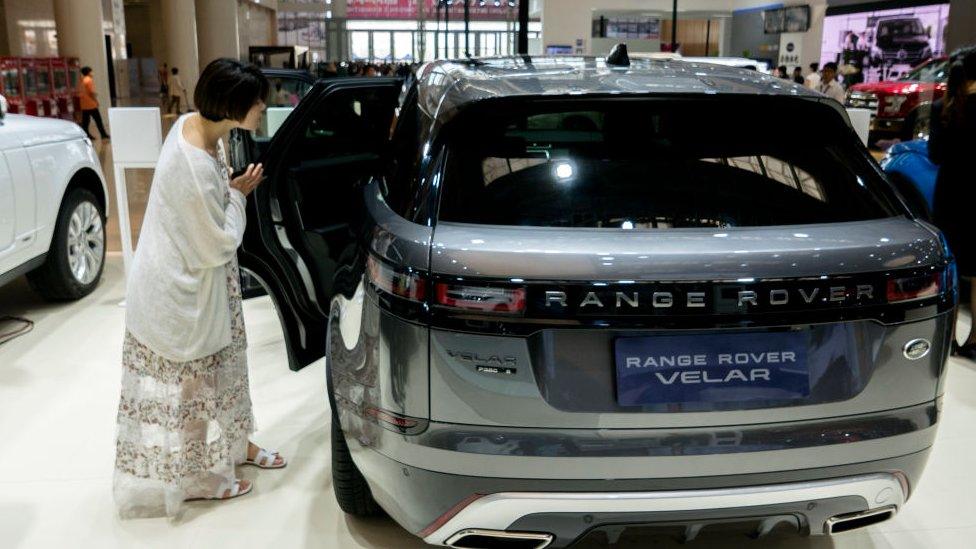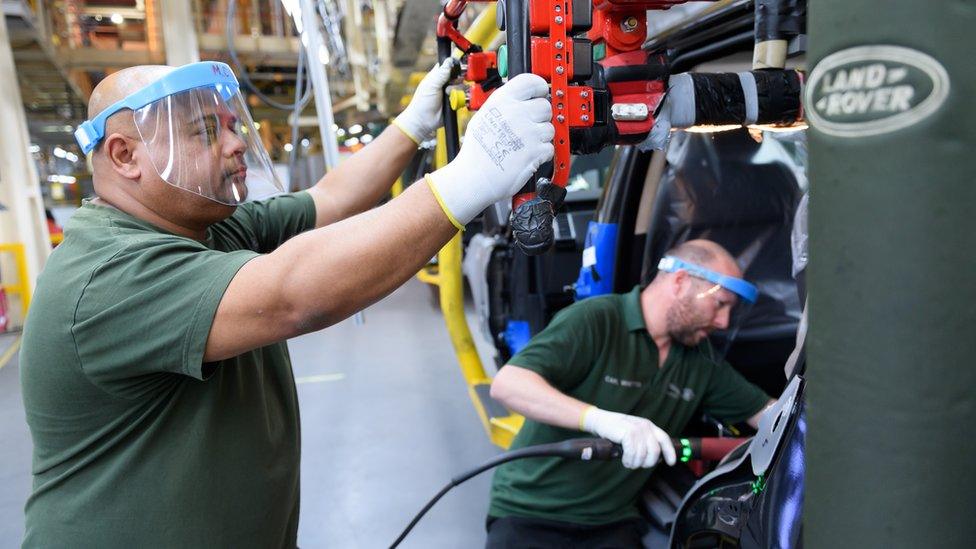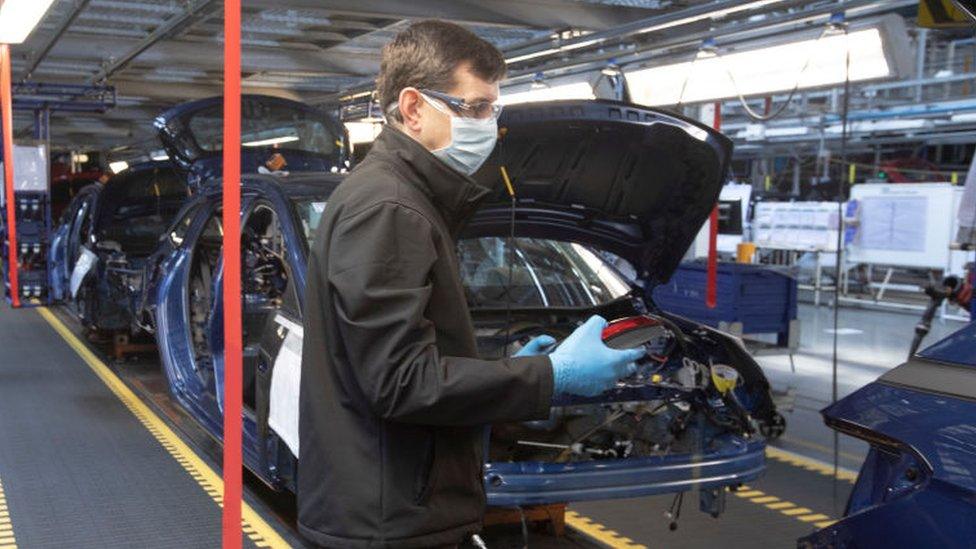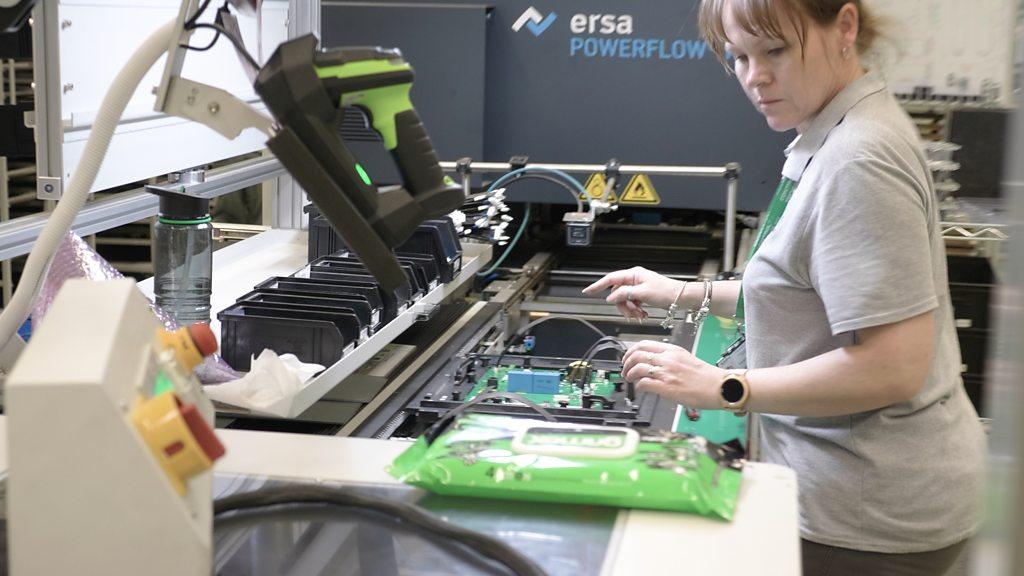Why Midlands car industry is in a state
- Published

About 1,700 staff members have returned to work at Jaguar Land Rover's Solihull plant
'The state is back!'
TUC General Secretary Frances O'Grady is not alone in seeing the years of economic rebuilding that will follow the pandemic as an opportunity to re-establish the role of the public sector and, with it, that of the the trade unions she represents.
The logic goes like this. If the government is to pump-in billions to rescue strategic industries, what might the taxpayer demand in return?
Curbs on executive pay and bonuses, perhaps? More of a say for the public in general and their workers in particular in the running of those businesses?
It is more than 30 years since Margaret Thatcher talked about "rolling back the frontiers of socialism", allowing commercial lame ducks to "go to the wall" and defeating "the union barons".
The Left in British politics is now daring to dream that post-Covid Britain will finally witness the rolling back of Thatcherism and of the market economics which successive governments have generally bought into ever since.
It is widely accepted taxes must to go up sooner or later to help fill the £300bn hole in the UK's balance sheet.
But ministers promise this does not have to mean a return either to what Boris Johnson dismisses as "the A-word" (he can't bring himself to say "austerity") or to what most Conservatives see as the over-taxed, over-regulated, strike-bound environment from which Mrs T managed our escape.
The West Midlands Conservative Mayor, Andy Street, insists it is the private sector which must lead us out of the looming recession.
And yet he is also at the front of the queue for state aid in a region which could be among the hardest-hit by Covid-19.
Regional asset
He and his fellow leaders on the board of the West Midlands Combined Authority recently joined senior cabinet ministers for the first in a series of regional, virtual, Cobra-style meetings.
Mr Street placed help for our struggling car makers , externalright at the top of his 13-point wish list to ministers.
"In this unprecedented economic situation, the automotive industry is a vital regional and national asset. The jobs and livelihoods of so many West Midlands people are bound up in this sector and therefore it must be safeguarded", he tweeted, external.
You can see why.

Car sales have started to recover in China
For so long one of Britain's industrial showpieces, the Midlands-based carmaker Jaguar Land Rover is reckoned by the ratings agency Standard and Poor's to be burning through about £1bn during every month of the lockdown.
The vast majority of its 40,000 employees are here in the UK and it supports a vast array of businesses in its supply chain, most of them here in the West Midlands.
JLR disputes suggestions that it is looking for a state injection of up to £2bn, though analysts reckon it will need at least half that sum just to survive.
The Indian-owned company says only that it is "constantly in discussion with the government over a whole range of matters relating to Covid-19".
Operation reboot
There will be plenty more Cobra meetings and plenty more intensive negotiations with mayors, business and union leaders including Frances O'Grady before we know not just the scale of economic reconstruction but also the direction in which it will take us all.
Into this collective reimagining of Britain's future, every economic visionary will project their dream scenarios: a step-change in the way we either work from home or travel to work (I see the West Midlands is to be a pilot region for the new generation of electric scooters); less reliance on private motoring in city centres like Birmingham even though, paradoxically, the guidance during the time of Covid-19 is to take the car in preference to public transport; an accelerated transition towards new technologies developing sustainable and renewable energy...
On and on goes the wish list of epoch-making "reboots".
Little wonder, then, that the political opinion-formers should also see this as their moment to decide, once and for all, that age-old debate: just look at the state of the place - and the place of the state!
- Published24 May 2020

- Published14 May 2020

- Published12 May 2020

